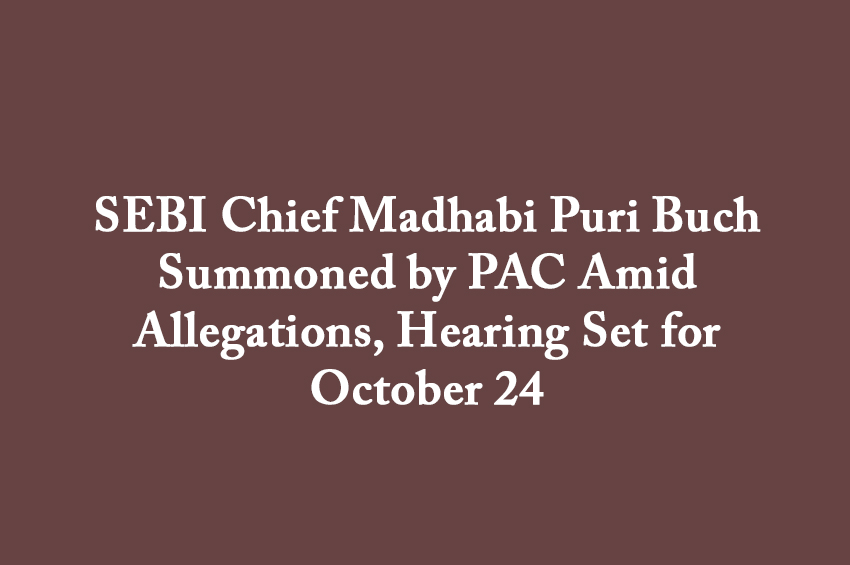Winning Bizness Desk
In a significant development, the Public Accounts Committee (PAC) of the Indian Parliament has summoned Madhabi Puri Buch, Chairperson of the Securities and Exchange Board of India (SEBI), to appear before it on October 24. The summons comes in the wake of allegations stemming from the Hindenburg Report, which accused Buch of improper conduct during her tenure as the head of India’s market regulator. Although Buch promptly dismissed these allegations as malicious and baseless, the matter has resurfaced with the PAC now taking an active interest in investigating the claims. According to the experts, the PAC's decision to summon Madhabi Puri Buch and other key officials underscores the importance of transparency and accountability in India’s regulatory framework. As the hearing date approaches, all eyes will be on Buch and SEBI, with the potential outcome having far-reaching effects on the financial markets and regulatory practices in India. Whether the allegations hold merit or are ultimately dismissed, this inquiry has put the spotlight on the importance of maintaining the highest standards of integrity in financial oversight.
PAC Also Summons Key Government Officials
In addition to Madhabi Puri Buch, PAC has extended its summons to officials from both the Department of Economic Affairs and the Department of Revenue. This signals the committee’s intent to thoroughly scrutinize the claims and the actions taken by government bodies, including SEBI, regarding their oversight of financial activities in India. The Public Accounts Committee (PAC) is an influential body consisting of 22 Members of Parliament (MPs)—15 from the Lok Sabha and 7 from the Rajya Sabha. Importantly, none of its members can be part of the government, ensuring an independent review of public expenditure and income. The committee is currently chaired by Congress MP KC Venugopal, and its role is primarily to audit government spending and revenues based on reports submitted by the Comptroller and Auditor General (CAG).
The Allegations & The SEBI Chief
The controversy revolves around accusations made by Hindenburg Research, an American short-seller firm, which released a report implicating Buch in an alleged collusion with the Adani Group. The report accused Madhabi Puri Buch and her husband, Dhaval Buch, of having financial interests in offshore funds linked to the Adani Group, a conglomerate led by billionaire Gautam Adani. Hindenburg alleged that this connection led SEBI to refrain from taking stringent action against Adani Group in various regulatory matters. Both Madhabi Puri Buch and the Adani Group have denied these claims. SEBI, under Buch’s leadership, has maintained that it followed all regulatory processes in accordance with the law, and that the allegations are unfounded. The Adani Group also rejected Hindenburg's accusations, labeling them as part of a coordinated effort to harm the company's reputation and manipulate the stock market.
A Broader Scrutiny
In addition to summoning SEBI officials, the PAC has reportedly extended its scrutiny to other regulatory bodies, including the Telecom Regulatory Authority of India (TRAI). This indicates that the committee is looking into the broader regulatory environment and whether there have been lapses or misconduct across multiple sectors. The involvement of the Department of Economic Affairs and the Department of Revenue underscores the scope of the PAC's inquiry. Both departments play a critical role in shaping and enforcing economic policies, particularly concerning investments and tax regulations. The PAC's interest in their actions suggests that the committee may be exploring whether there were any systemic issues or oversights in how India’s financial market was regulated during the period in question.
Implications for SEBI and the Financial Sector
The summons to Madhabi Puri Buch adds a new layer of scrutiny to SEBI, one of India’s most important regulatory bodies. SEBI's role is crucial in maintaining market integrity, protecting investor interests, and ensuring transparency in the financial markets. Any suggestion of misconduct or regulatory failure could have serious ramifications, not only for SEBI but also for investor confidence in India’s financial system. Buch, who has had a long and respected career in financial regulation, now faces a critical test of her leadership. While she has denied any wrongdoing, her upcoming appearance before the PAC could provide an opportunity to clear the air and address any concerns about SEBI's handling of the Adani Group matter.


